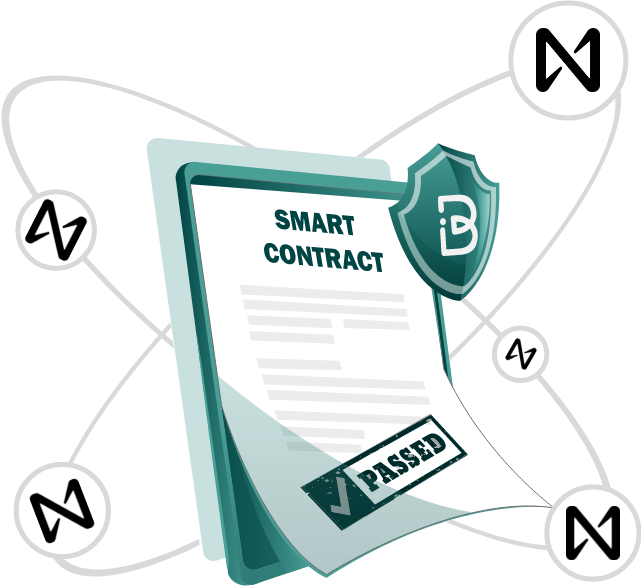What are NEAR Smart Contracts?
NEAR is a development platform built on a sharded, proof-of-stake consensus, L1 blockchain. NEAR smart contracts are written in general-purpose languages: Rust and AssemblyScript. It is a new yet widely adopted protocol for smart contract development with a unique combination of sharding and PoS mechanisms.
Smart contracts on the NEAR blockchain are reliable and offer high flexibility. Securing every smart contract aspect becomes necessary due to so many attack vectors. ImmuneBytes' auditors are well-versed in many programming languages built on NEAR. Get your NEAR smart contracts audited before it's too late.
Why Is It Important?
NEAR smart contracts utilize Rust as their most commonly used language for development, which is a new language, and only a few resources are available concerning its security flaws. Thus, getting audits from experts with hands-on experience working on them is crucial!

No More Loss of Funds
Vulnerabilities in NEAR smart contracts can result in massive losses of funds, both yours and your clients. With ImmuneBytes audits, you can rest assured that your assets are safe on the blockchain.

Code Optimization
Gas plays an important role in NEAR smart contracts. It becomes crucial to optimize the usage of gas in your source code. We not only reveal bugs but also offer recommendations for improving gas usage.

Build Trust
The stamp of an audit on your smart contracts attracts potential investors and clients. Smart contracts audited by ImmuneBytes have a lesser chance of getting exploited.
In 2022, Smart Contracts Vulnerabilities Were Alone Responsible
For Hacks Over $1.5Bn. Are You Sure About Your Own Smart Contract(s)?
Why Should You Undergo An Near Smart Contract Audit?
NEAR is dynamically growing. It is designed to be scalable and high-performance, making building and deploying easy for developers. Currently, the biggest problem with the deployment of smart contracts is security. Hacks are increasing alarmingly, with millions of dollars being drained from DeFi protocols. NEAR is undergoing many changes, and with an ecosystem still in its infancy, a this-party audit is always the best choice! The auditors at ImmuneBytes possess a multitude of skills regarding security and blockchain. Audits ensure adherence to security standards and regulations.
$6B
Lost in Crypto Hacks So Far
$3.8B
Lost in 2022 Alone
82%
Hacks Targeted Defi Protocols
3x Damage
Lost funds + Lost trust + Lost market value
What Do We Offer?
ImmuneBytes offers complete, round-the-system security measures to secure your NEAR projects. We execute integrated manual and automated NEAR security audits. Thus, balancing inefficiencies, timeliness, functionality, and ambiguities in smart contracts.


Extensive Audit Report
Our audit reports are comprehensive and document every measure taken during the audit process. We classify the vulnerabilities according to their severity levels and offer remediations and code optimizations.


Check For 100+ Vulnerabilities
We analyze a smart contract for over a hundred vulnerabilities. These include bugs that have been exploited and others that could be exploited in the future.


Smart Contract Fuzzing
We fuzz-test your smart contracts as an additional measure. Fuzzing a smart contract ensures that it will not behave unexpectedly against any given input, minimizing the risk of hacks.


Post Refactor Reaudits
Not just once, we audit your code twice! Once your developers review our audit report and make the recommended fixes, we again analyze your contract and prepare the final audit report.


Security Test Cases
Our auditors use frameworks like Foundry, HardHat and Truffle to write unit test cases other than the developers provided. We ensure to traverse every possible branch of execution in the source code.


Quick Turnaround Time
A dedicated team of auditors is assigned to your project, who usually take 3-10 days to complete an audit, depending on the code size. We are result-oriented and understand the gravity of deadlines.
Migrate Your Smart Contract From Testnet To Mainnet,
But Without Vulnerabilities.
Recent Blogs
Everything you need to know to get familiar with Web3! News, Blogs, Announcements and more.
FAQs
The world of NEAR is enormous. And so are the questions associated with them. Here, we list the top 6 most frequently asked questions on the NEAR ecosystem.
